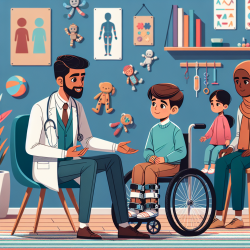Introduction
As practitioners in the field of speech-language pathology, we constantly seek ways to improve outcomes for children. A recent study titled Diverse adolescents’ transcendent thinking predicts young adult psychosocial outcomes via brain network development provides valuable insights that can be leveraged to enhance our practices. This blog will delve into the findings of this research and offer practical ways to implement these insights into your work.
The Power of Transcendent Thinking
Transcendent thinking, defined as the ability to consider broader perspectives and ethical implications beyond the immediate context, is a hallmark of mid-adolescence. The study followed 65 adolescents aged 14-18 over five years, examining how their transcendent thinking influenced brain development and psychosocial outcomes.
Key Findings
The research revealed that adolescents who engaged in transcendent thinking showed increased connectivity between the default-mode network (DMN) and the executive control network (ECN) in the brain. This enhanced connectivity predicted better identity development in late adolescence and higher self-liking and relationship satisfaction in young adulthood.
Practical Applications for Practitioners
Here are some data-driven strategies to incorporate transcendent thinking into your practice:
- Encourage Reflective Thinking: Create opportunities for adolescents to reflect on social stories and their broader implications. Use open-ended questions to prompt deeper thinking.
- Foster Ethical Discussions: Introduce scenarios that require ethical decision-making. Encourage adolescents to consider multiple perspectives and the long-term consequences of their actions.
- Integrate Cultural Values: Recognize and incorporate the cultural backgrounds of adolescents in discussions. This can help them relate their personal experiences to broader societal issues.
- Support Identity Development: Provide activities that help adolescents explore their values, beliefs, and goals. This can include journaling, group discussions, and mentorship programs.
Encouraging Further Research
The study underscores the importance of transcendent thinking in adolescent development. However, further research is needed to explore the causal relationships and potential interventions. Practitioners are encouraged to stay informed about the latest research and consider participating in studies that examine the impact of transcendent thinking on various outcomes.
Conclusion
By incorporating transcendent thinking into our practices, we can help adolescents develop critical cognitive and emotional skills that will benefit them throughout their lives. The findings from this study provide a compelling case for the importance of reflective, ethical, and culturally relevant thinking in adolescent development.
To read the original research paper, please follow this link: Diverse adolescents’ transcendent thinking predicts young adult psychosocial outcomes via brain network development.










